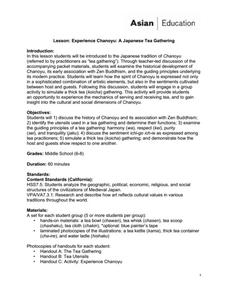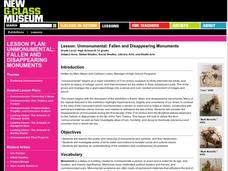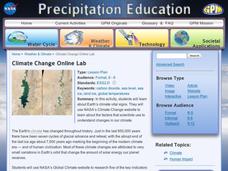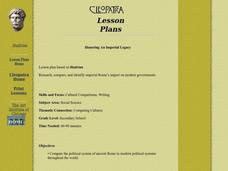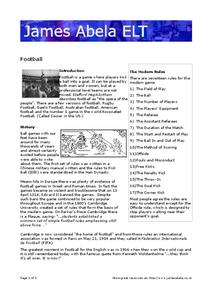Federal Reserve Bank
The Legacy of the Olympics: Economic Burden or Boon?
Do the economic benefits of major sporting events such as the Olympics or the World Cup outweigh the expected costs? Using fundamental economic terms, discover the explicit and implicit costs and benefits for countries that host these...
EngageNY
The Opposite of a Number
It's opposite day! The fourth installment of a 21-part module teaches scholars about opposites of integers and of zero. Number lines and real-world situations provide an entry point to this topic.
Curated OER
"Whose (Is)land is This?": topics in Immigration and The Tempest
Class members compare the ways the subject of immigration is treated in The Tempest, Act I, scene ii, Act II, scene i and Act III, scene ii with patterns in American history. After tracing their own family’s journey, a series of...
Asian Art Museum
Experience Chanoyu: A Japanese Tea Gathering
As part of the study of Japanese cultural history, introduce your class members to Chanoyu, the Way of Tea. After a discussion of the history and key elements of Chanoyu, class groups perform the ceremony.
New Museum of Contemporary Art
Lesson: Unmonumental: Fallen and Disappearing Monuments
Due to vandalism, war, and urban decay, many of the world's great monuments have fallen to ruin. Here is an interesting lesson that increases understanding of the dichotomy between what are intended as lasting tributes, and their...
ProCon
Gold Standard
If all the mined gold in the world was melted across a football field, it would rise 5.4 feet. That's just one interesting fact pupils learn when using the debate topics website to determine if the United States should return to a gold...
Curated OER
Early African Kingdoms & Empires
Give your class a thorough view of African history with this series of photographs, maps, and engaging questions. Coupled with a lecture about human migration and religious and European influences on the continent, this presentation will...
New Bedford Whaling Museum
A New Bedford Voyage!
A thorough set of activities, articles, and reference material can enlighten your class about the history of whaling in New England. Kids travel back to a time when whale products were valuable and hunting whales was a way to help the...
NASA
Climate Change Online Lab
What are the key indicators that show scientists that our planet is in the fastest warming trend ever? Learners go on a WebQuest to examine the evidence for themselves. Following several links to NASA sites, kids see how the global...
Voice of America
Henry Ford, 1863-1947: He Revolutionized the Auto Industry
How did Henry Ford change the world? One word: automobile. After reading a two-page passage about Henry Ford's contributions to society with the invention of the automobile, readers respond to a series of 10 reading comprehension...
Curated OER
200 Greatest Pop Culture Icons
Young scholars define the term "exoticism" and identify musical elements used by 19th and 20th century composers and modern pop icons to convey exoticism.
Curated OER
Konnichiwa! Welcome to Japan!
Students study feudal Japan, the islands of the country, and its religions. In this history of Japan lesson, students complete a 9 lesson unit about Japan, its history, its feudalism, its islands, and its religions.
Curated OER
Ancient World
Sixth graders play a powerpoint jeopardy game. This can be used as a test or as a way to review information. This is a culminating test for our unit on Ancient Worlds. The jeopardy game is based on goals in math, language arts, and...
Curated OER
The White Line - A One Act Play
Pupils discuss amendments of the Constitution that cover due process and discuss them in relation to the play "The White Line". They determine how national security measures conflict with the issues of due process during wartime. They...
Curated OER
Ancient Civilizations: Medieval and Early Modern Times
Seventh graders gain an understanding of the history of Mongolian culture through making inferences about Mongolian artwork
Curated OER
Total War
Students view a video about the result of using atomic weapons during World War II. They examine how human rights are violated during wartime. They listen as family members come and speak to the class about their experiences during the...
Curated OER
History Today
Young scholars use the newspaper to determine how history is being made in your community, region or country.They identify the different components that comprise a newspaper. This lesson contains adaptations from elementary to high school.
Curated OER
Patchtowns: Big Industry, Little Towns
Students explore what it was like to live in a coal mining town. In this history lesson plan, students discuss specific details about the lives of coal company workers and their families.
Curated OER
History of the Michigan Supreme Court from the Territorial Court and the founding of the Michigan Supreme Court in 1836 to Justice Mary S. Coleman and her interpretation of "One Court of Justice"
Students trace the history of the Michigan Supreme Court from when the state was still a territory. They define procedures as they relate to the Court. They compare and contrast the territorial court to the new Court.
Curated OER
Times Marches On
In this PowerPoint, students learn to distinguish between the terms "ancient" and "modern." The presentation gives visual and and written definitions of these words. Students respond to 5 questions that require them to decipher...
Curated OER
Honoring An Imperial Legacy
Students research, compare, and identify imperial Rome's impact on modern governments. They compare the political system of ancient Rome to modern political systems throughout the world.
Curated OER
"Medieval Travels, The Mongols and the Silk Road Across Asia"
Eleventh graders are able to take information obtained from the various readings of primary and secondary sources and classroom discussions directed by the instructor and relate it to the student's curretn real life experiences. They...
Curated OER
Football
In this history of football worksheet, students read a passage about the history of football and then answer six reading comprehension questions over the passage and three discussion questions.



